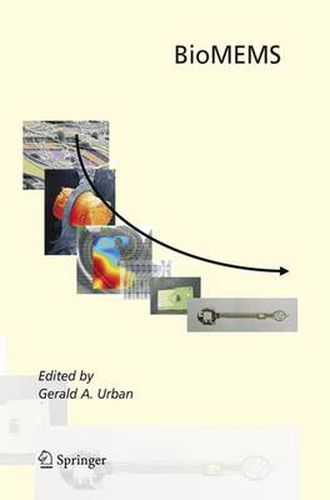Readings Newsletter
Become a Readings Member to make your shopping experience even easier.
Sign in or sign up for free!
You’re not far away from qualifying for FREE standard shipping within Australia
You’ve qualified for FREE standard shipping within Australia
The cart is loading…






This title is printed to order. This book may have been self-published. If so, we cannot guarantee the quality of the content. In the main most books will have gone through the editing process however some may not. We therefore suggest that you be aware of this before ordering this book. If in doubt check either the author or publisher’s details as we are unable to accept any returns unless they are faulty. Please contact us if you have any questions.
Explosive growth in the field of microsystem technology (MST) has introduced a variety of promising products in major disciplines from microelectronics to life sciences. Especially the life sciences and health care business was, and is expected to be a major market for MST products. Undoubtedly the merging of biological sciences with micro- and nanoscience will create a scientific and technological revolution in future. Microminiaturization of devices, down to the nanoscale, approaching the size of biological structures, will be a prerequisite for the future success of life sciences. Bioanalytical and therapeutic micro- and nanosystems will be mandatory for system biologists in the long run, to obtain insight into morphology, the function and the interactive processes of the living system. With such a deeper understanding new and personalized drugs could be developed leading to a revolution in life sciences. Today, microanalytical devices are used in clinical analytics or molecular biology as gene chips. In parallel, standard microbiomedical products are employed in the intensive care and surgical theatre, mainly for monitoring and implantation purposes. The gap between these two different scientific fields will be closed, however, as soon as functional micro devices can be produced, allowing a deeper view into the function of cells and whole organisms.
Here, a new discipline evolved which focuses on microsystems for living systems called BIOMEMS . In this review at a glance the exciting field of bio-microsystems, from their beginnings to indicators of future successes are presented. It will also show that a broad penetration of micro and nano technologies into biology and medicine will be mandatory for future scientific and new product development progress in life science.
$9.00 standard shipping within Australia
FREE standard shipping within Australia for orders over $100.00
Express & International shipping calculated at checkout
This title is printed to order. This book may have been self-published. If so, we cannot guarantee the quality of the content. In the main most books will have gone through the editing process however some may not. We therefore suggest that you be aware of this before ordering this book. If in doubt check either the author or publisher’s details as we are unable to accept any returns unless they are faulty. Please contact us if you have any questions.
Explosive growth in the field of microsystem technology (MST) has introduced a variety of promising products in major disciplines from microelectronics to life sciences. Especially the life sciences and health care business was, and is expected to be a major market for MST products. Undoubtedly the merging of biological sciences with micro- and nanoscience will create a scientific and technological revolution in future. Microminiaturization of devices, down to the nanoscale, approaching the size of biological structures, will be a prerequisite for the future success of life sciences. Bioanalytical and therapeutic micro- and nanosystems will be mandatory for system biologists in the long run, to obtain insight into morphology, the function and the interactive processes of the living system. With such a deeper understanding new and personalized drugs could be developed leading to a revolution in life sciences. Today, microanalytical devices are used in clinical analytics or molecular biology as gene chips. In parallel, standard microbiomedical products are employed in the intensive care and surgical theatre, mainly for monitoring and implantation purposes. The gap between these two different scientific fields will be closed, however, as soon as functional micro devices can be produced, allowing a deeper view into the function of cells and whole organisms.
Here, a new discipline evolved which focuses on microsystems for living systems called BIOMEMS . In this review at a glance the exciting field of bio-microsystems, from their beginnings to indicators of future successes are presented. It will also show that a broad penetration of micro and nano technologies into biology and medicine will be mandatory for future scientific and new product development progress in life science.